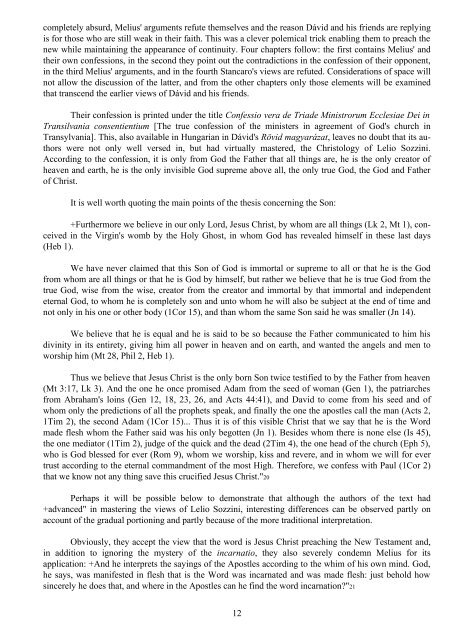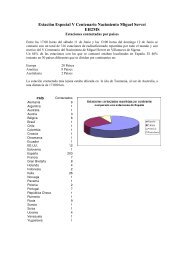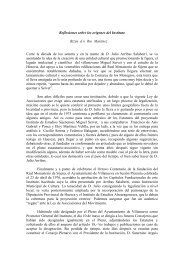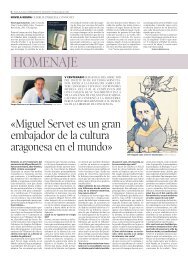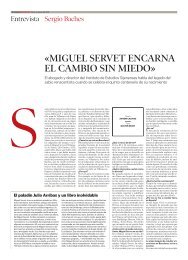New Page
New Page
New Page
You also want an ePaper? Increase the reach of your titles
YUMPU automatically turns print PDFs into web optimized ePapers that Google loves.
completely absurd, Melius' arguments refute themselves and the reason Dávid and his friends are replying<br />
is for those who are still weak in their faith. This was a clever polemical trick enabling them to preach the<br />
new while maintaining the appearance of continuity. Four chapters follow: the first contains Melius' and<br />
their own confessions, in the second they point out the contradictions in the confession of their opponent,<br />
in the third Melius' arguments, and in the fourth Stancaro's views are refuted. Considerations of space will<br />
not allow the discussion of the latter, and from the other chapters only those elements will be examined<br />
that transcend the earlier views of Dávid and his friends.<br />
Their confession is printed under the title Confessio vera de Triade Ministrorum Ecclesiae Dei in<br />
Transilvania consentientium [The true confession of the ministers in agreement of God's church in<br />
Transylvania]. This, also available in Hungarian in Dávid's Rövid magyarázat, leaves no doubt that its authors<br />
were not only well versed in, but had virtually mastered, the Christology of Lelio Sozzini.<br />
According to the confession, it is only from God the Father that all things are, he is the only creator of<br />
heaven and earth, he is the only invisible God supreme above all, the only true God, the God and Father<br />
of Christ.<br />
It is well worth quoting the main points of the thesis concerning the Son:<br />
+Furthermore we believe in our only Lord, Jesus Christ, by whom are all things (Lk 2, Mt 1), conceived<br />
in the Virgin's womb by the Holy Ghost, in whom God has revealed himself in these last days<br />
(Heb 1).<br />
We have never claimed that this Son of God is immortal or supreme to all or that he is the God<br />
from whom are all things or that he is God by himself, but rather we believe that he is true God from the<br />
true God, wise from the wise, creator from the creator and immortal by that immortal and independent<br />
eternal God, to whom he is completely son and unto whom he will also be subject at the end of time and<br />
not only in his one or other body (1Cor 15), and than whom the same Son said he was smaller (Jn 14).<br />
We believe that he is equal and he is said to be so because the Father communicated to him his<br />
divinity in its entirety, giving him all power in heaven and on earth, and wanted the angels and men to<br />
worship him (Mt 28, Phil 2, Heb 1).<br />
Thus we believe that Jesus Christ is the only born Son twice testified to by the Father from heaven<br />
(Mt 3:17, Lk 3). And the one he once promised Adam from the seed of woman (Gen 1), the patriarches<br />
from Abraham's loins (Gen 12, 18, 23, 26, and Acts 44:41), and David to come from his seed and of<br />
whom only the predictions of all the prophets speak, and finally the one the apostles call the man (Acts 2,<br />
1Tim 2), the second Adam (1Cor 15)... Thus it is of this visible Christ that we say that he is the Word<br />
made flesh whom the Father said was his only begotten (Jn 1). Besides whom there is none else (Is 45),<br />
the one mediator (1Tim 2), judge of the quick and the dead (2Tim 4), the one head of the church (Eph 5),<br />
who is God blessed for ever (Rom 9), whom we worship, kiss and revere, and in whom we will for ever<br />
trust according to the eternal commandment of the most High. Therefore, we confess with Paul (1Cor 2)<br />
that we know not any thing save this crucified Jesus Christ."20<br />
Perhaps it will be possible below to demonstrate that although the authors of the text had<br />
+advanced" in mastering the views of Lelio Sozzini, interesting differences can be observed partly on<br />
account of the gradual portioning and partly because of the more traditional interpretation.<br />
Obviously, they accept the view that the word is Jesus Christ preaching the <strong>New</strong> Testament and,<br />
in addition to ignoring the mystery of the incarnatio, they also severely condemn Melius for its<br />
application: +And he interprets the sayings of the Apostles according to the whim of his own mind. God,<br />
he says, was manifested in flesh that is the Word was incarnated and was made flesh: just behold how<br />
sincerely he does that, and where in the Apostles can he find the word incarnation?"21<br />
12


